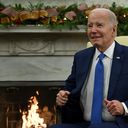Biden warned by White House legal counsel to stop bringing donors to Oval Office

President Biden was advised last year by the White House Counsel office that giving big-dollar donors tours of the Oval Office might raise legal issues and he has since stopped the practice, according to people familiar with the matter.
Why it matters: Biden has been hosting donors inside the White House residence for private meals and briefings, to help energize them and convince them that he has a plan to beat former President Trump.
- The donor outreach has caused some concern in the White House Counsel's office, which has allowed the lunches and dinners to proceed with clear restrictions, including on where the meals can take place and who can attend.
- Biden has been known to show the Oval Office to many of his guests, but he decided to stop including an Oval tour for donors early in the campaign after issues were raised by the counsel's office. The exclusive briefings and meals are expected to continue.
- In order to comply with ethics laws, the donors are not directly solicited for donations and events are required to take place in either the White House map room, the old family dining room or the tennis pavilion on the ground's south lawn.
- The Washington Post reported earlier Wednesday on the meals.
The intimate gatherings are organized by campaign co-chair and Democratic mega-donor Jeffrey Katzenberg.
What they're saying: "It is typical for any president, regardless of party, to host supporters at the White House complex, which is both a working office as well as a personal residence," White House deputy press secretary Andrew Bates told Axios.
- "President Biden and his team take all rules concerning the White House and re-elections seriously, and we're proud of that," he said.
- "There are certain rooms in the White House, particularly in the residence that are not covered under the Hatch Act," said Kedric Payne, ethics director at the Campaign Legal Center, referring to the federal law which governing campaigning for elected officials.
- "The president is allowed to legally meet with and entertain donors at the White House," Payne said. "But you cannot give campaign contributions or solicit for campaign contributions while in the White House."
Zoom out: Both Republican and Democratic administrations running for re-election have used the glamour and the glitz of the White House to help donors feel valued and appreciated by the president and his top advisers.
- Holiday party invites, state dinners, and even rounds at the White House bowling alley are all standard ways to keep deep-pocketed supporters happy – and ready to write checks when the campaign kicks off.
Zoom in: Trump routinely pushed, and violated, the legal boundaries of permissible political activity at the White House, including accepting the GOP nomination from the south lawn in 2020.
- Trump argued that his acceptance speech was within the bounds of the law — "It is legal. There is no Hatch Act, because it doesn't pertain to the President," he said — but that defense didn't account for the work that official White House staff had to do to pull off the event.
- After he was out of office, thirteen of Trump's aides were reprimanded by a government watchdog group for abusing the power of the office and violating the Hatch Act, which prohibits explicit campaign activity from government officials.
Between the lines: Due to COVID precautions, the Biden administration didn't fully leverage the White House's social calendar for the first two years of his presidency, leading to some apathy among the party's bundlers and millionaires.
- Starting in the holiday season in 2022, that began to change.
- In 2023, the White House hosted three state dinners, where some of the party's biggest donors received invites.